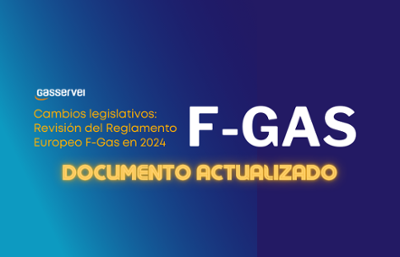

The impact of F-Gas on the refrigeration sector

Gas Servei has analysed the new regulation (EU) 2024/573, F-GAS 2024, summarising the most relevant information as it affects the refrigeration sector in general. The regulation repeals the previous one and has been in force since 11 March.
In the same way as the repealed regulation, the reduction of quotas, also known as Phase Down, establishes a system for the progressive reduction in the commercialisation of fluorinated products in the EU, directly regulating the availability of products on the market based on their contribution to global warming, according to Gas Servei. "This contribution or Global Warming Potential (GWP) is defined as the amount of CO2 by weight to which the product in question is equivalent. The quota reduces the equivalent amount of CO2, so for the same amount of product to be available on the market it must have a lower impact on global warming. As demand does not decrease, the sector is forced to move towards lower GWP products, i.e. more sustainable products.
At European level the fee will cost €3/teq CO2, although this will be subject to review in line with inflation, as "these revenues are intended to be used to cover administrative costs, support capacity building, implementation and enforcement, and accelerate the deployment of alternatives to fluorinated greenhouse gases".
In addition to the direct reductions applied, the decrease in availability for the refrigeration sector will have to be added due to the fact that the new regulation includes the MDI sector in the HFC quota system. "This sector will be entitled to receive an amount of quotas corresponding to 70% of its current consumption, which in Spain alone is approximately 400,000 teq CO2 per year, according to the AEMPS".
Restrictions
Among other issues, Gas Servei analyses the restrictions on maintenance. In the case of refrigeration, F-gases with a GWP greater than or equal to 2,500 will be banned from 2025 onwards. "Reclaimed/recycled fluorinated gases with a GWP greater or less than 2,500 will continue to be permitted until 31 December 2029. Gases with a GWP greater or less than 750 will be banned from 1 January 2032". On the other hand, reclaimed/recycled fluorinated gases with a GWP between 2500 and 750 will be permitted for the maintenance or servicing of existing stationary refrigeration equipment.
"These limitations do not apply to military equipment, equipment intended for applications designed to cool products at temperatures below 50°C, and equipment intended for nuclear power plant cooling applications".
For air conditioning and heat pumps, virgin fluorinated gases with a GWP greater than or equal to 2,500 will be banned from 2026. Reclaimed/recycled fluorinated gases with a GWP greater than or equal to 2,500 will continue to be permitted until 31 December 2031. "In any case, the refrigerant gases commonly used in this type of equipment have a GWP of less than 2,500, so they will not be affected at this time in terms of installation maintenance, as demonstrated in the attached table". The recycled gases may only be used by the company that undertook the recovery as part of the maintenance or overhaul, or by the company for which it was undertaken.




